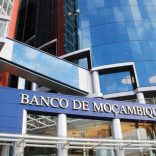Launch of the region-wide co-creation for common agenda initiative for Mozambique, Malawi and ...
Mozambique: State companies increasingly “mired” in debt

File photo: O País
The Mozambican state business sector’s external debt increased by 23.5% between 2018 and 2019, from about US$1.4 billion to US$1.7 billion, representing 12% of gross domestic product (GDP).
Empresa Nacional de Hidrocarbonetos (ENH) was the biggest beneficiary of external financing in 2019, absorbing about US$1.6 billion. This is followed by Mozambique Airports with debt of around US$102.9 million, Petromoc, S.A. (US$ 26.4 million) and Eletricidade de Moçambique (EDM) with US$14.3 million.
This quartet raised the level of indebtedness of state companies by 23.5% between 2018 and 2019, from US$1,431.7 million to US$1,768.6 million, which represents 12% of Mozambique’s gross domestic product (GDP), the Ministry of Economy and Finance’s Report on the Public Debt of 2019, consulted by ‘O País Económico’, reveals.
The loan out taken by ENH was to finance its participation in the liquefied natural gas (LNG) projects in the Rovuma Basin, in Cabo Delgado.
“Ninety-nine percent of the foreign debt stock observed in 2019 was denominated in US dollars as a consequence, among other factors, of financing for the hydrocarbon exploration sector, in which the Government of Mozambique ensured its participation through loans contracted with the consortium concessionaires in Areas 1 and 4. These debts are mostly associated with the operations of ENH, which represents about 91% of the debt of the state business sector,” the document published by the Ministry of Economy and Finance observes.
In addition to the concessionaires in Areas 1 and 4 of the oil and gas exploration projects, the biggest lenders to the state business sector are the National Development Bank of Brazil (BNDES), EximBank of India, the European Bank of Investment (EIB) and the Southern African Development Bank (DBSA).
Debt refunds
In terms of amortisation of external loans taken out by the state business sector, a little over US$97.4 million was repaid in the period under analysis, of which US$60.7 million (62%) was interest payments and US$36.6 million (38%) capital.
According to the Ministry of Economy and Finance report, of the total interest paid in 2019, US$56.9 million (94%) is related to public companies, while US$3.7 million (6%) is interest paid by companies where the state has a shareholding.
As for the amortisation of capital, US$21.5 million (59%) refers to companies where the state has a shareholding, and US$15.2 million (41%) to public companies per se.
In the domestic sphere, the volume of state business debt to commercial banks amounted to US$22.609 million, which represents 2.4% of GDP.
This performance represents a reduction of 19% compared to the US$27.936 million registered in 2018, a decrease both at the level of public companies and of the companies where the state has a shareholding of 12.5% and 22% respectively, companies where the state has a shareholding representing approximately 66.8% of total domestic debt.
Four financial institutions own more than 90% of State business sector debt: Banco Comercial e de Investimentos (BCI), with 44.3%, Millennium bim (18.5%), Standard Bank (16.2%) and MozaBanco (8.3%).
In terms of beneficiaries, around 80% of this debt is concentrated in three companies: PETROMOC (38.5%), Linhas Aéreas de Moçambique (21.6%) and Airports of Mozambique (17.3%).
With regard to repayments, state companies paid the banks 13.122 million meticais in 2019, of which MZN 7.817 million (60.3%) corresponds to the amortization of capital and MZN 5.206 million (39.7%) refers to interest.
Total public debt stock
In the past five years, between 2015 and 2019, there was an increase in the stock of public debt from US$9,615.92 million to US$12,365.15 million, or about 29% (US$2,749.23 million) more.
Public debt continues to be composed mainly of an external component, which represents 80% of the total stock, corresponding to 63% of GDP, while domestic debt represents 20% of the total stock and 16% of GDP.
“In recent years, public external debt has increased considerably in response to the need to contract credit to finance projects and programmes for the country’s economic development and growth,” the Maputo government reasons.
By Edson Arante












Leave a Reply
Be the First to Comment!
You must be logged in to post a comment.
You must be logged in to post a comment.